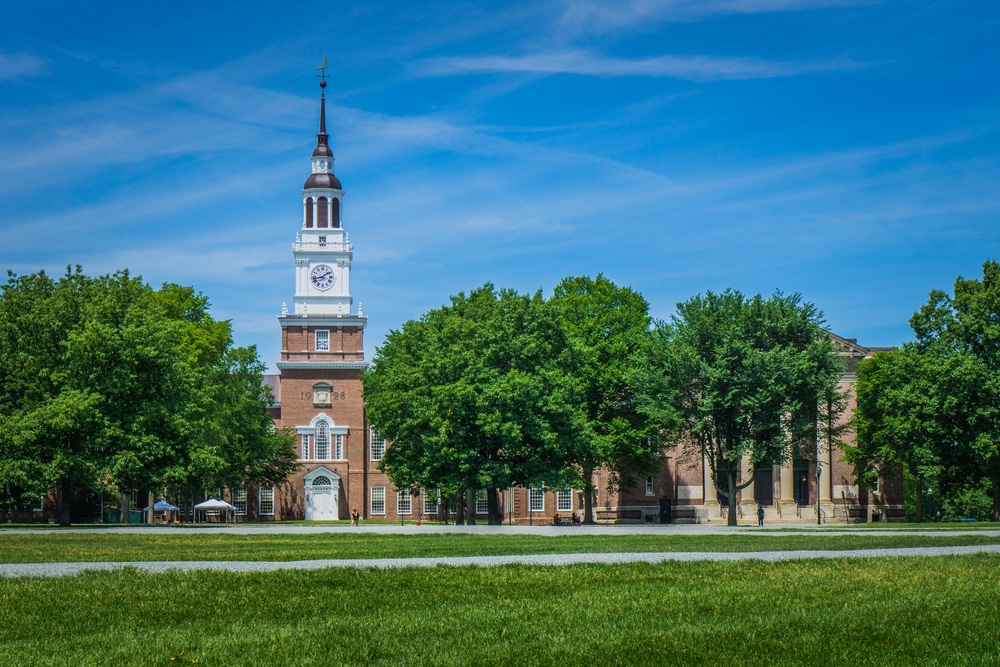What Is Dartmouth Known For?
What is Dartmouth known for? The Ivy League school is renowned for its rich heritage and achievements, standing as a symbol of academic excellence and innovation. Consistently ranked among the top 20 national universities, Dartmouth’s rigorous admissions process reflects its high standards. The college prioritizes academics, seeking applicants with high GPAs who are at or near the top of their class. Recently, Dartmouth introduced supplemental essays to their application process—important, yet secondary to an outstanding academic record.
Dartmouth Fast Facts
- Location: Hanover, NH
- Student Population: 6,761
- Acceptance Rate: 6%
What is Dartmouth known for?
Dartmouth is known for its rigorous academics, Ivy League status, and small class sizes. It is also famous for its Greek life (inspiring the movie Animal House), rural setting, and outdoorsy vibe.
Founded in 1769 by Eleazar Wheelock, a Congregational minister from Connecticut, Dartmouth has played a key role in American history. Wheelock established the college to educate Native American youth, English youth, and others. Samson Occom, a Mohegan Indian and one of Wheelock’s first students, helped raise the funds to start the college.
For its first 200 years, Dartmouth did little to support Native students. In 1970, it reaffirmed its mission, and two years later, it established one of the first Native American programs in the country. Today, about 200 Indigenous students from over 70 tribal nations and communities attend Dartmouth, and there are over 1,200 Native graduates among its alumni.
Here is a list of things Dartmouth is known for all over the world:
- Conservative but Worldclass Academics as an Ivy League School
- Strong Liberal Arts Programs
- The Excellent Thayer School of Engineering
- Active Greek Life
- Colorful Culture and Campus Experience
Conservative but Worldclass Academics as an Ivy League School
Dartmouth was founded by Eleazar Wheelock, a Congregational minister from Connecticut, to educate Native American youth, English youth, and others. Samson Occom, a Mohegan Indian and one of Wheelock’s early students, played a key role in raising funds to establish the college. As an Ivy League member, Dartmouth is part of an elite group of eight private colleges in the northeastern United States known for their academic excellence and historical significance.
Dartmouth consistently ranks among the top 20 national universities in the United States, reflecting its high academic standards and selective admissions process. With a student-to-faculty ratio of 7:1, Dartmouth emphasizes personalized education and close interactions between students and professors. The college offers a wide range of undergraduate and graduate programs through its four schools: Arts and Sciences, the Geisel School of Medicine, the Thayer School of Engineering, and the Tuck School of Business.
Moreover, Dartmouth’s quarter system allows students to concentrate on a few classes over 10 weeks each term, rather than juggling many courses over a 15-week semester. Most classes are taught by professors, with only a few handled by graduate students or TAs, unlike at many other colleges. The college also offers career and professional development programs for students aiming to pursue graduate school, internships, or job opportunities.
Key Programs and Initiatives
- Dartmouth Plan (D-Plan): Introduced in the 1970s, the D-Plan allows students to customize their academic schedules, providing flexibility and opportunities for internships, research, and study abroad.
- Native American Program: Reaffirming its founding mission, Dartmouth established one of the first Native American programs in the country in 1972. Today, the program supports around 200 Indigenous students from over 70 tribal nations and communities.
- Dartmouth Center for the Advancement of Learning (DCAL): DCAL promotes innovative teaching and learning practices, supporting faculty development and enhancing the student learning experience.
The flexibility of the D Plan offers excellent internship opportunities, as Dartmouth students avoid competing with large numbers of other college students for summer positions. The D Plan also allows students to explore the world and travel for extended periods. Study abroad is particularly popular at Dartmouth; a 2018 survey of new students found that 75% were interested in studying abroad.
Dartmouth’s vibrant Greek life, which inspired the movie “Animal House,” is a key part of its social scene and reflects its traditional roots. The Dartmouth Review, an independent conservative newspaper founded in 1980, is known for its controversial and outspoken views on campus issues, shaping political discourse at the college.
Notable figures such as Daniel Webster, class of 1801, defended Dartmouth’s charter in the landmark Supreme Court case Dartmouth College v. Woodward in 1819, establishing the precedent for private institutions’ independence from state interference. John Sloan Dickey, Dartmouth’s president from 1945 to 1970, expanded the college’s global reach by emphasizing international studies and creating the Great Issues course to address major global challenges.
In recent years, Dartmouth has promoted innovation through initiatives like the Magnuson Center for Entrepreneurship and the DEN Innovation and New Venture Incubator, helping students and faculty launch new ventures. The Dartmouth Sustainability Office leads efforts to reduce the college’s environmental footprint and promote sustainable practices across campus.
Strong Liberal Arts Programs
Dartmouth College, part of the Ivy League, is known for its strong liberal arts programs.
The Dartmouth Plan (D-Plan) lets you create customized academic schedules, offering flexibility and exploring various disciplines. This quarter system allows for an intensive focus on a few subjects each term and includes opportunities for internships and study abroad programs. You must complete courses across disciplines, ensuring a broad academic foundation in arts, literature, cultures, social analysis, natural sciences, and quantitative reasoning.
Dartmouth’s interdisciplinary programs enhance its liberal arts education. The Women’s, Gender, and Sexuality Studies program, established in 1978, offers a multidisciplinary approach to gender and sexuality. Dartmouth’s Environmental Studies Program, founded in 1970, is one of the oldest in the country and addresses environmental challenges from various academic perspectives. The Leslie Center for the Humanities also supports research and teaching initiatives across humanistic disciplines.
Initiatives and Programs
- The Dickey Center for International Understanding: Established in 1982, this center promotes global understanding through interdisciplinary research, education, and public service.
- The Ethics Institute: Founded in 1982, this institute encourages ethical reflection and inquiry across Dartmouth’s curriculum, supporting teaching and research in ethics.
- Foreign Study Programs (FSPs) and Language Study Abroad (LSAs): Dartmouth offers extensive study abroad opportunities, immersing students in different cultures and academic environments. About 75% of students participate in these programs during their college years.
- Cross-Cultural Programs: Dartmouth’s diverse study abroad programs reflect its commitment to cross-cultural understanding, spanning continents and disciplines.
Dartmouth College is known for its distinguished faculty, including Pulitzer Prize winners and MacArthur Fellows, who are dedicated to teaching and mentoring students. The college emphasizes undergraduate research, offering many opportunities for students to engage in original projects with faculty supervision. Notable alumni like poet Robert Frost and television producer Shonda Rhimes highlight Dartmouth’s commitment to creativity and intellectual growth.
Dartmouth has integrated digital arts and innovation into its curriculum through the Digital Arts, Leadership, and Innovation Lab (DALI). The college also includes sustainability in its programs, preparing you to address global challenges with interdisciplinary approaches. Dartmouth’s liberal arts programs are flexible and focused on academic excellence, combining a comprehensive education with innovative initiatives and a dedicated faculty. This approach ensures you develop global understanding, ethical reflection, and critical thinking skills to navigate and contribute to an ever-evolving world.
The Excellent Thayer School of Engineering
Dartmouth’s Thayer School of Engineering, founded in 1867, is one of the oldest engineering schools in the U.S. Known for its innovative education, Thayer emphasizes interdisciplinary study, hands-on learning, and real-world problem-solving.
Unlike many engineering schools with separate departments, Thayer operates as a single, unified department. Thayer also integrates engineering with the liberal arts, encouraging students to take courses in various disciplines to develop critical thinking, creativity, and communication skills.
Thayer offers an ABET-accredited Bachelor of Engineering (BE) degree, which you can complete in one additional year beyond the Bachelor of Arts (AB) degree. This program focuses on hands-on, project-based learning to prepare you for professional engineering practice. Thayer’s Master of Engineering Management (MEM) program, in partnership with the Tuck School of Business, combines engineering and management education to prepare you for leadership roles in technology-driven organizations.
Thayer’s curriculum includes many project-based courses, like the popular ENGS 21: Introduction to Engineering, where you design and prototype solutions to real-world problems. You’ll find extensive opportunities for undergraduate research, working alongside faculty on cutting-edge projects. This hands-on experience is invaluable for your professional development and prepares you for a successful engineering career.
Notable Initiatives
- Dartmouth Entrepreneurial Network (DEN): Thayer supports student and faculty entrepreneurship with resources, mentorship, and funding opportunities.
- Human-Centered Design: Thayer’s curriculum and research focus on developing solutions that meet user and societal needs.
- Sustainability and Innovation: Thayer integrates environmental considerations into education and research, preparing students to tackle global challenges like energy, climate change, and resource management.
Distinguished Alumni and Faculty
- Sylvia McBride Bagg: A pioneer of women’s engineering at Thayer, she made significant contributions to chemical engineering.
- John Sununu: A Thayer alumnus who served as New Hampshire Governor and White House Chief of Staff.
- Eric Fossum: Inventor of the CMOS image sensor, used in most digital cameras, and a Thayer professor inducted into the National Inventors Hall of Fame.
Dartmouth’s Thayer School of Engineering is a top U.S. engineering school known for its interdisciplinary approach, innovative curriculum, and hands-on learning. By integrating engineering with liberal arts, fostering entrepreneurship, and addressing global challenges, Thayer prepares graduates to lead and innovate. Its history, notable initiatives, and distinguished alumni and faculty highlight its excellence in engineering education.
Active Greek Life
Dartmouth College’s Greek life is a key part of the campus social scene, with about 60% of students involved in fraternities, sororities, and co-ed houses. These organizations are a significant part of the college’s traditions and community.
Fraternities
- Alpha Chi Alpha (ΑΧΑ): Known for its strong sense of brotherhood and community service activities.
- Alpha Delta (ΑΔ): The inspiration for the movie “Animal House,” it is renowned for its social events and community engagement.
- Beta Alpha Omega (ΒΑΩ): Focuses on academic excellence and leadership development.
- Chi Gamma Epsilon (ΧΓΕ): Engages in various philanthropic efforts and maintains strong alumni connections.
- Gamma Delta Chi (ΓΔΧ): Known for its inclusive environment and diverse membership.
- Kappa Kappa Kappa (ΚΚΚ): One of the oldest fraternities, emphasizing tradition and campus involvement.
- Phi Delta Alpha (ΦΔΑ): Promotes academic achievement and community service.
- Psi Upsilon (ΨΥ): Active in social events and charitable activities.
- Sigma Alpha Epsilon (ΣΑΕ): Known for its leadership programs and philanthropic efforts.
- Sigma Nu (ΣΝ): Focuses on personal development and community service.
- Zeta Psi (ΖΨ): Engages in various campus events and charity work.
Sororities
- Alpha Phi (ΑΦ): Emphasizes leadership, scholarship, and community service.
- Chi Delta (ΧΔ): Known for its strong sisterhood and philanthropic initiatives.
- Delta Delta Delta (ΔΔΔ): Actively participates in fundraising for St. Jude Children’s Research Hospital.
- Epsilon Kappa Theta (ΕΚΘ): Focuses on inclusivity and community involvement.
- Kappa Delta (ΚΔ): Engages in various community service projects and leadership development.
- Kappa Kappa Gamma (ΚΚΓ): Known for its academic support and philanthropic efforts.
- Sigma Delta (ΣΔ): Emphasizes diversity and social justice initiatives.
Co-ed Houses
- Alpha Theta (ΑΘ): Inclusive and welcoming environment with a focus on community service.
- Phi Tau (ΦΤ): Known for its strong emphasis on inclusivity and progressive values.
- The Tabard: A socially conscious and inclusive community.
Greek organizations at Dartmouth host social events like parties, formals, and mixers, creating a lively social scene. Many fraternities and sororities are involved in philanthropy, raising funds for charities and organizing community service projects, such as Delta Delta Delta’s work for St. Jude Children’s Research Hospital and Alpha Phi’s focus on heart health.
Greek life offers leadership and personal development opportunities, with members often taking on leadership roles and participating in training programs. Many organizations provide academic support through study groups, tutoring, and scholarships, fostering academic excellence. Strong alumni networks offer mentorship, career advice, and networking opportunities.
Overall, Dartmouth’s Greek life enriches the campus experience through social interaction, community service, leadership development, and academic support, highlighting its importance in the campus community.
Colorful Culture and Campus Experience
Dartmouth College in Hanover, New Hampshire, offers a lively campus life rich with traditions and events. The college’s diverse student body contributes to a vibrant atmosphere.
- Winter Carnival, a cherished tradition since 1911, celebrates winter with snow sculptures, ice skating, polar bear swims, sports competitions, and a themed dance.
- Homecoming (1895), features the iconic Dartmouth Night parade, a bonfire built by the freshman class, and a football game. The bonfire is a highlight.
- Green Key Weekend (1921), is a spring festival with concerts, parties, and student activities, giving students a chance to unwind as the academic year ends.
- First-Year Trips, organized by the Dartmouth Outing Club since 1935, welcome new students with outdoor adventures like hiking, canoeing, and camping, helping them bond and adjust to Dartmouth’s community.
- Establishment of the Dartmouth Outing Club (1909): The DOC is one of the oldest and largest collegiate outing clubs in the country. It organizes outdoor activities and maintains the Appalachian Trail section near Dartmouth, fostering a strong outdoor culture on campus.
- Hood Museum of Art (1985): The Hood Museum of Art houses an extensive collection of art and artifacts, providing cultural enrichment and educational opportunities for students and the community. The museum underwent a major renovation and expansion and reopened in 2019.
- Baker-Berry Library: The Baker-Berry Library serves as the intellectual hub of the campus. The library features the Orozco Murals, painted by Mexican artist José Clemente Orozco between 1932 and 1934, which are a National Historic Landmark.
- Dartmouth College supports many cultural and affinity groups, such as the Afro-American Society, La Alianza Latina, Native Americans at Dartmouth, and the Pan Asian Council. These organizations celebrate diverse cultures and support students from various backgrounds.
- The Hopkins Center for the Arts (Hop) is the hub for performing arts, hosting performances by the Dartmouth Symphony Orchestra, Dartmouth Dance Ensemble, and a cappella groups like the Dartmouth Aires.
Notable events include the annual Pow-Wow, established in 1973 by Native Americans at Dartmouth, celebrating Native American heritage with traditional dances, music, and crafts. The Dimensions of Dartmouth weekend, started in the early 2000s, lets admitted students experience Dartmouth life by attending classes, staying with current students, and participating in campus events.
Dartmouth’s culture and campus life are shaped by its traditions, diverse organizations, and community events. From the historic Winter Carnival to the dynamic Green Key Weekend, Dartmouth offers a lively campus experience that enhances the overall educational journey.
Frequently Asked Questions
What is Dartmouth known for academically?
Dartmouth College is known academically for the following five areas:
- Liberal Arts Education: Dartmouth’s interdisciplinary liberal arts curriculum fosters critical thinking, creativity, and intellectual curiosity across a broad range of disciplines.
- Thayer School of Engineering: Renowned for its innovative approach to engineering education, emphasizing interdisciplinary study, hands-on learning, and solving real-world problems.
- Tuck School of Business: One of the top business schools globally, known for its rigorous MBA program, leadership development, and strong alumni network.
- Geisel School of Medicine: Recognized for its research in biomedical sciences, health policy, and clinical practice, with a holistic approach to medical education and patient care.
- Environmental Studies: One of the oldest and most respected programs in the country, focusing on interdisciplinary approaches to understanding and addressing environmental challenges.
What sport is Dartmouth known for?
Dartmouth College is renowned for its rowing tradition. Founded in 1833, the Dartmouth Rowing Club is one of the oldest collegiate rowing programs in the U.S. The men’s and women’s teams consistently excel in national and international competitions. The men’s heavyweight crew, in particular, has a rich history, often competing in prestigious events like the Intercollegiate Rowing Association (IRA) Championships and the Head of the Charles Regatta. The Connecticut River offers an ideal training environment for Dartmouth’s rowers.
Dartmouth also has a strong skiing tradition. The Dartmouth Ski Team, founded in 1909, has produced many Olympians and national champions. Its location near the White Mountains and the Dartmouth Skiway, its own ski area, provides top-notch training facilities for alpine and Nordic skiing. The Winter Carnival, one of the oldest collegiate winter festivals, features competitive skiing events, highlighting Dartmouth’s commitment to the sport.
Is Dartmouth expensive?
Yes, Dartmouth College is considered expensive, as it is a private Ivy League institution with high tuition and fees. For the 2023-2024 academic year, the estimated cost of attendance for undergraduate students includes:
- Tuition: $63,255
- Fees: $2,964
- Room and Board: $18,249
- Books and Supplies: $1,005
- Personal Expenses: $2,040
- Total Estimated Cost: Approximately $87,513 per year
However, Dartmouth offers substantial financial aid to help mitigate the cost for students and their families. The college has a need-blind admissions policy for U.S. students, meaning that a student’s ability to pay is not considered during the admissions process. Dartmouth meets 100% of demonstrated financial need for all admitted students through a combination of grants, scholarships, and work-study opportunities, with no loans included in the financial aid packages. This commitment ensures that students from a variety of economic backgrounds can attend Dartmouth without being burdened by excessive debt.
What is so special about Dartmouth?
Dartmouth College is known for its close-knit community, focus on undergraduate education and vibrant campus culture. The college emphasizes small class sizes and solid student-faculty interactions, promoting personalized learning and mentorship. Its liberal arts curriculum encourages interdisciplinary exploration and critical thinking. D-Plan allows flexible academic schedules, enabling students to pursue internships, study abroad programs, and other experiential learning opportunities throughout the year.
Dartmouth’s rich traditions and active campus life add to its unique character. Events like Winter Carnival, Homecoming, and Green Key Weekend offer numerous opportunities for community engagement and celebrating Dartmouth’s heritage.
The Hanover, New Hampshire campus, along with outdoor programs and facilities like the Dartmouth Outing Club, provides opportunities to explore and appreciate the natural environment. This blend of academic rigor, supportive community, and dynamic extracurricular offerings makes Dartmouth a special place for higher education.
What are your odds of getting into Dartmouth?
Due to its status as an Ivy League institution, getting into Dartmouth College is highly competitive. For the Class of 2027, Dartmouth received approximately 28,000 applications and admitted around 1,750 students, resulting in an acceptance rate of about 6.25%. Several factors influence the odds of admission, including academic performance, standardized test scores, extracurricular involvement, personal essays, recommendations, and demonstrated interest.
Dartmouth looks for students with a strong academic record. The middle 50% SAT score range for admitted students typically falls between 1440 and 1560, and the ACT range is between 32 and 35. High school GPA and class rank are also crucial, with most admitted students being at or near the top of their class.
Demonstrated leadership and involvement in extracurricular activities, community service, sports, and other interests can significantly enhance an application. Dartmouth values students who show passion, initiative, and a commitment to making a difference. Personal essays and recommendations also provide insight into an applicant’s personality, values, and writing ability, helping the admissions committee understand the individual’s unique contributions to the Dartmouth community.












































